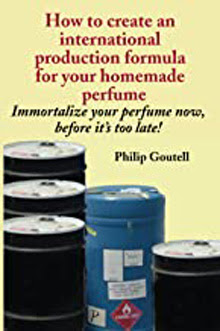What kind of perfume do you make? I make two kinds of perfume: commercial and personal. If I explain the differences between them it will help you better understand what kind of perfume you are making -- or aspire to make.
Let's start with the commercial. In many ways the scent is likely to be less interesting but it is more demanding to create. For a small perfume making operation to develop a commercial scent you focus on three issues: market, cost, and continuity. To sell, the fragrance must be acceptable to the market into which you hope to sell it. Oddball fragrances are risky. They are hard to sell.
Cost -- what it costs you to produce the fragrance -- is a big issue because you are limited by what you can sell it for. For a commercial fragrance there is always competition and keeping your price at a level expected by your potential customers is important. Price your fragrance too high and you lose people. But to hit your retail sweetspot price-wise you must calculate backwards, allowing for wholesale pricing, and then decide what you can afford to spend for each bottle you make and make the profit on that bottle you're looking for. When you do this calculation you may be surprised at how little you can afford to spend to produce that beautiful fragrance you had in mind.
"Continuity" refers to your ability to replicate your fragrance in new batches, which means you must be able to purchase more of the identical materials you used to make your perfume and mix then in the exact same ratios under the same conditions. You must be able to make more of the exact same fragrance which generally means going back to the same vendors who (hopefully) have not raised prices.
If you use any "natural" materials the problem is particularly awkward because you must be assured that your vendor has not switched sources. If so, your "fresh" supply now becomes an unknown.
As to other aroma materials, if your formula includes bases, as many formulas will, you must be certain that there will be an ongoing supply of that base. Many long since discontinued fragrances (say from around 1900 to the 1940's) are difficult to recreate because they make use of specialty bases that are no longer available.
Continuity for packaging materials is less of a problem unless your sales are supported by a particular visual presentation of your fragrance. Then your ability to obtain more of that same bottle, pump and overshell becomes important.
When developing a commercial fragrance, you've got to consider all of these elements before you start putting money into the project.
Personal fragrance
Personal fragrances are a whole different story. When you are making a fragrance for love of the fragrance, with no plans for commercialization, none of the three elements required of a commercial fragrance apply. There's no market research to evaluate -- the market is you. There's no cost consideration. You can use whatever materials you have on hand or can afford to buy. There's no continuity consideration (unless you get really lucky with a formula and like it so much that you want to make more so you can use more, share it around, or even sell it.)
More distinctions
When you're just messing around for your own pleasure you may be a little lax in documenting your formula or marking the bottle with your favorite trial, which means even if you have the materials on hand, you may not be easily able to produce another batch -- an identical batch -- since you're not sure how you made the first batch. If your goal is a commercial fragrance, you can't be lax. Every bottle, vial, mixing pot or test tube must be labeled and that label must relate to an entry in your notebook showing each material you used, how much of it you used, and where you obtained it, so that you can get more of the (exact) same. If you were planning to commercialize your fragrance on a re-run you would not, for example, use vetiver from a different source. The two sources would not be providing you with the same material, regardless of their being sold under the same name. But when you're making a perfume simply for your own pleasure, this isn't so important and you might find the slight variation interesting and both equally appealing.
Try both paths
Professional perfumers mess around and, for both pleasure and professional development, create for themselves scents that will never be commercialized. If you have been creating fragrances just for your own pleasure, try, as a test, to develop a "commercial" fragrance -- one that will please people in a particular market, be affordable to them and yet be profitable for you to make, and be fully repeatable -- if the market cried out for more.
Best wishes.!
Monday, February 8, 2016
Subscribe to:
Post Comments (Atom)


No comments:
Post a Comment